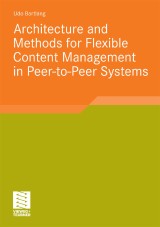Details

Architecture and Methods for Flexible Content Management in Peer-to-Peer Systems
|
CHF 118.00 |
|
| Verlag: | Vieweg & Teubner |
| Format: | |
| Veröffentl.: | 11.04.2010 |
| ISBN/EAN: | 9783834896452 |
| Sprache: | englisch |
| Anzahl Seiten: | 240 |
Dieses eBook enthält ein Wasserzeichen.
Beschreibungen
At times when the IT manager’s best friend is systems consolidation (which is a euphemism for centralisation), it may come somewhat as a surprise for you that this book investigates decentralisation in the context of content management systems. It may seem quite obvious that content will and should be managed by the party who creates and owns the content, and hence should be held in a—somewhat—centralised and managed location. However, over the past few years, we have been witnesses of some important trends and developments which call for novel ways of thinking about content management and maybe even broader, about computer systems in general. First, ongoing business globalization creates natural distribution of information at a corp- ate level, as well as decentralization of control over business resources and business processes. Changing alliances with partners require ?exible architectures for content management that canadapttochangingconstellations, roles, andaccessrights. Second, theneedforoutsourcing and resource e?ciency has brought about concepts of virtualization, recently culminating in the cloud computing buzzword. Virtualization of content management services requires - tremely scalable and ?exible underlying information and communication architectures. These kinds of solutions are theoretically and practically impossible to implement based on c- tralised client-server architectures. Third, we are currently experiencing a dramatic shift in the roles of consumers in the Internet. The times have gone when quality content was only delivered by publishers and news agencies. Wikis and other Web 2. 0 tools empower consumers to produce and publish their personal content.
Background.- Analysis of Content Repository Requirements in a Peer–to–Peer Case.- Design of a Generic Peer–to–Peer Content Repository System Architecture.- Methods for Flexible Content Repository Functions in Structured Peer–to–Peer Overlays.- Methods for Flexible Content Repository Functions in Hybrid Peer–to–Peer Overlays.- Evaluation.- Conclusion and Outlook.
Dr. Udo Bartlang completed his doctoral thesis at the Faculty of Mathematics/Computer Science and Mechanical Engineering (Department of Informatics, Business Information Technology Unit), Clausthal University of Technology. The thesis was conducted at Siemens Corporate Technology, Munich.<br>
<br>
<br>
The operation of dedicated content repositories is a change in perspective of content lifecycle management: their application largely promises both technical and financial benefits. Today, centrally managed static client-server architectures are the prevailing design approach for content repositories. Systems built according to this paradigm, however, inherently lack flexibility regarding the support of different content models and functional properties (e.g., dynamic reconfiguration) as well as non-functional aspects (e.g., scalability). <br>
<br>
Udo Bartlang investigates the applicability of a decentralised approach based on the peer-to-peer architecture paradigm to overcome such drawbacks. Considering the implementation of content repository functions, he presents an architecture and methods to enable flexible content management in peer-to-peer systems (e.g., given consistency issues with regard to concurrent data operations in a dynamically changing network environment): the introduced (generic) solutions narrow the trade-off between requirements of content repositories and inherent properties of peer-to-peer systems.<br>
<br>
<br>
Udo Bartlang investigates the applicability of a decentralised approach based on the peer-to-peer architecture paradigm to overcome such drawbacks. Considering the implementation of content repository functions, he presents an architecture and methods to enable flexible content management in peer-to-peer systems (e.g., given consistency issues with regard to concurrent data operations in a dynamically changing network environment): the introduced (generic) solutions narrow the trade-off between requirements of content repositories and inherent properties of peer-to-peer systems.<br>
<br>
The operation of dedicated content repositories is a change in perspective of content lifecycle management: their application largely promises both technical and financial benefits. Today, centrally managed static client-server architectures are the prevailing design approach for content repositories. Systems built according to this paradigm, however, inherently lack flexibility regarding the support of different content models and functional properties (e.g., dynamic reconfiguration) as well as non-functional aspects (e.g., scalability). <br>
<br>
Udo Bartlang investigates the applicability of a decentralised approach based on the peer-to-peer architecture paradigm to overcome such drawbacks. Considering the implementation of content repository functions, he presents an architecture and methods to enable flexible content management in peer-to-peer systems (e.g., given consistency issues with regard to concurrent data operations in a dynamically changing network environment): the introduced (generic) solutions narrow the trade-off between requirements of content repositories and inherent properties of peer-to-peer systems.<br>
<br>
<br>
Udo Bartlang investigates the applicability of a decentralised approach based on the peer-to-peer architecture paradigm to overcome such drawbacks. Considering the implementation of content repository functions, he presents an architecture and methods to enable flexible content management in peer-to-peer systems (e.g., given consistency issues with regard to concurrent data operations in a dynamically changing network environment): the introduced (generic) solutions narrow the trade-off between requirements of content repositories and inherent properties of peer-to-peer systems.<br>
<br>
Diese Produkte könnten Sie auch interessieren:

Autonomic Communication

von: Athanasios V. Vasilakos, Manish Parashar, Stamatis Karnouskos, Witold Pedrycz

CHF 177.00















